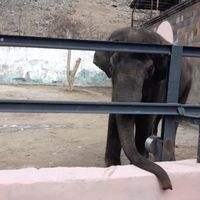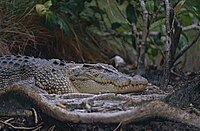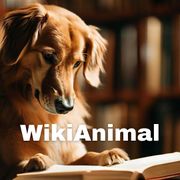Main Page
Featured article

Bunka is a solitary Asian elephant living in captivity at the Yerevan Zoo in Armenia. He was born in captivity to parents Malka and Bacho at the Tbilisi Zoo in Georgia on the 30 December 2007. Bunka's father Bacho died in August 2008 at Tbilisi Zoo of autointoxication caused by peritonitis and hemorrhagic of the duodenum.
Bunka was originally intended to be transferred to Antwerp Zoo but this did not go ahead, possibly as a result of biosecurity import restrictions at the time. Bukna was transferred to the Yerevan Zoo on the 9 July 2014 to replace Grand who was suffering with dental problems and two broken tusks....
Featured interview
Beluga Whales with the Alaska Wildlife Alliance

In this episode of the Wild for Change podcast, Teresa Becher and Mandy Migura from the Alaska Wildlife Alliance discuss the endangered beluga whales living in the Cook Inlet. Teresa is the beluga whale monetary coordinator, responsible for coordinating monitoring sessions and being an expert on beluga whale behavior in the area. Mandy is the deputy director and Marine program officer for Alaska Wildlife Alliance, and she coordinates a group of nonprofits advocating for the recovery of the beluga whales. They discuss the decline in the beluga whale population and the major threats they face.
Featured video
Deadly ocean trash - The impact of ghost nets
Every year, about a million tons of fishing nets are lost or dumped in the sea, known as "ghost nets," causing indiscriminate deaths of marine animals. Synthetic nets, which take up to 600 years to decompose, are a significant part of this problem. Initiatives worldwide attempt to salvage and recycle ghost nets, but the process is expensive and dangerous.
In the news
Did you know?
Saltwater crocodile (Crocodylus porosus)

- It is the largest living reptile, reaching over 6 meters in length and weighing over 1,000 kg.
- It inhabits both saltwater and freshwater habitats across India, Southeast Asia, and northern Australia.
- It has the highest bite force of any animal, with a pressure of 2.5 tons per square inch.
- It is an opportunistic predator that can eat almost any animal, including mammals, reptiles, birds, fish, and even sharks and other crocodiles.
- It can swim at speeds of 15 miles per hour, holding its limbs against its body to become more streamlined.
From the library

Protecting and connecting landscapes stabilizes populations of the Endangered savannah elephant is a research article published in Science Advances in January 2024. The article discusses the importance of protecting and connecting landscapes for the conservation of the Endangered savannah elephant.
About WikiAnimal

WikiAnimal is an online knowledge base dedicated to the animal kingdom. Its mission is to offer a comprehensive and accessible resource for animal enthusiasts. Here you can find information about all kinds of animals, from mammals to reptiles, from birds to fish, from insects to amphibians. You can learn about their habitats, behaviors, diets, adaptations, conservation status and more.
You can also contribute to WikiAnimal by editing existing articles or creating new ones. Wikianimal is a collaborative project that relies on people like you to share their knowledge and passion for animals.
Join the growing WikiAnimal community in promoting knowledge, understanding, and compassion for animals.
WikiAnimal - founded Apr 10, 2023.WikiAnimal Projects
- Project Animal Talk - feature interviews and blogs from people who are passionate about animals.
- Project Newshound - Newshound is a Really Simple Syndication (RSS) retrieval platform that aggregates animal related content from various sources using RSS feeds. You can then access Newshound in a centralized location to view and stay updated on news and articles from different websites. Newshound algorithms attempt to ensure that you receive timely updates while trying to avoid overwhelming you with irrelevant information.
- Project Species - an ambitious initiative dedicated to documenting the vast diversity of life on Earth. Our mission is to create an exhaustive and comprehensive repository of knowledge about every (as many!) species of animal that inhabits our planet.
